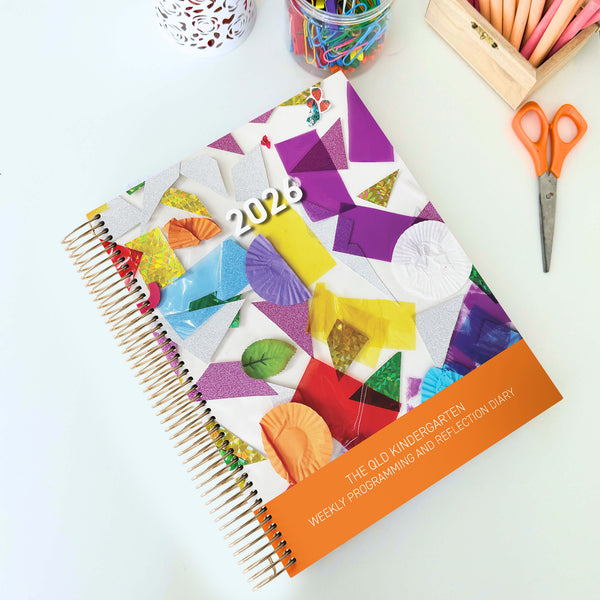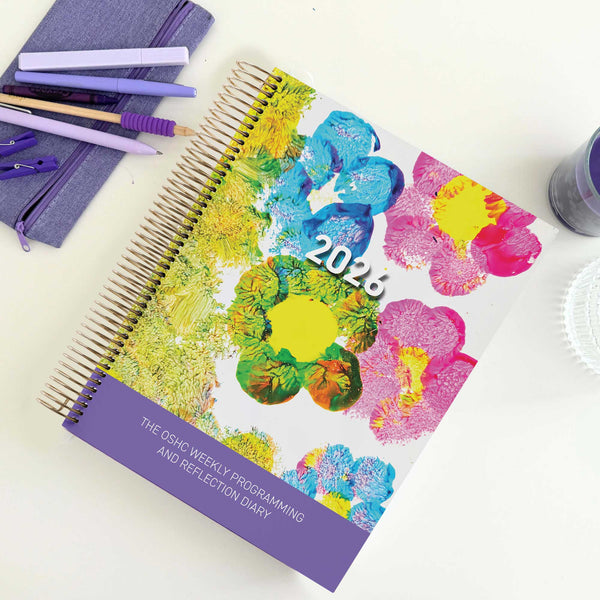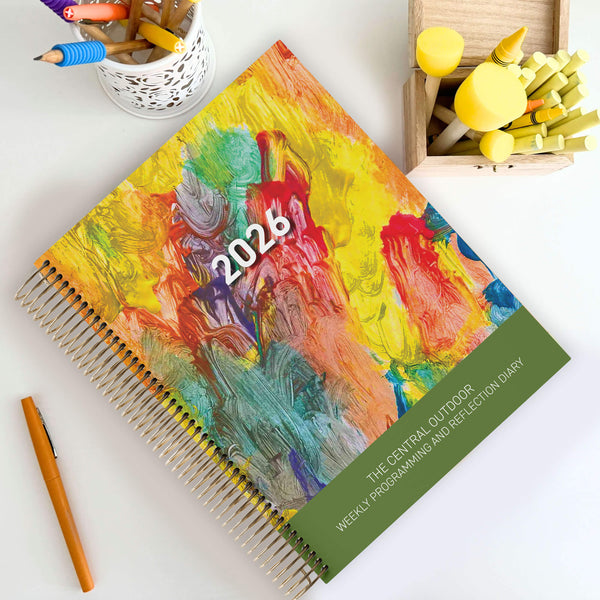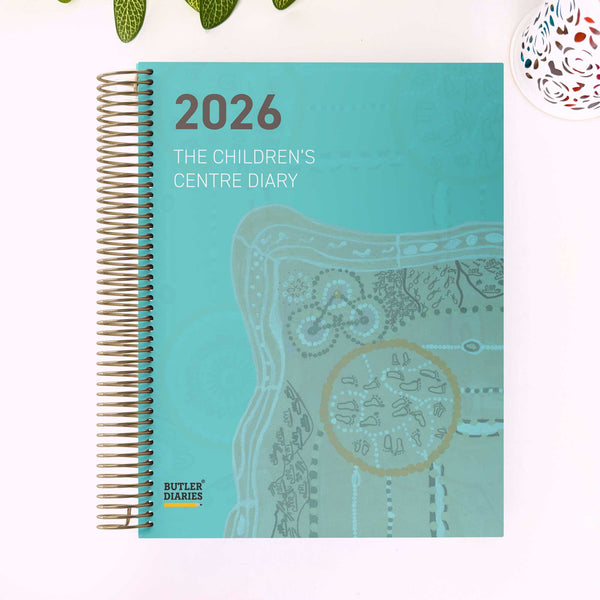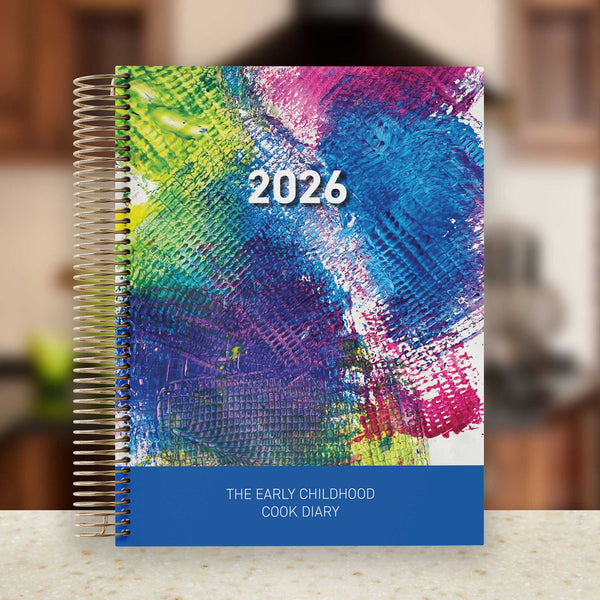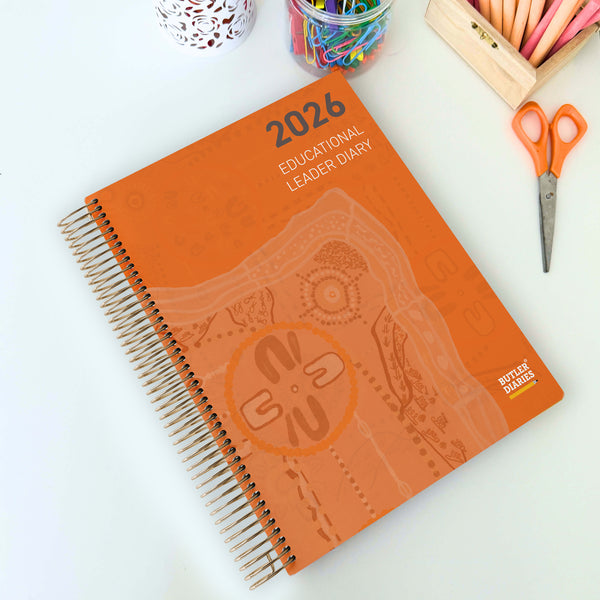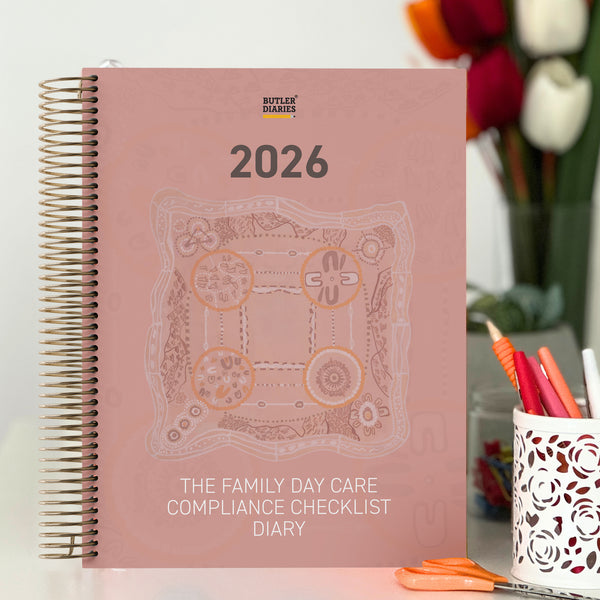The question of sustainability in Early Childhood Education and Care (ECEC) is more relevant now than ever. We were recently asked, "Wouldn’t it be more sustainable on digital media rather than all that paper?" It's an important question, and one that deserves a nuanced answer. We decided it was the perfect moment for reflection so that's exactly what we did in this article.
Is digital really "greener"?
When comparing digital and paper tools, it’s important to recognise that neither option is impact-free. Unfortunately, digital technology comes with its own hidden costs, such as:
- High energy consumption,
- High greenhouse emissions,
- Significant wate use, and
- Generation of toxic waste.
Data centres, which power our devices and cloud storage, consume enormous amounts of electricity, often generated from fossil fuels. They also require vast quantities of water for cooling, contributing to strain on local resources, and produce significant greenhouse gas emissions. On top of this, the production and disposal of electronic devices generate large volumes of e-waste, much of it containing toxic materials that are difficult to recycle safely.
Paper, on the other hand, also has an environmental footprint. Paper production requires energy, water, and in some cases contributes to deforestation if not managed responsibly. However, paper has advantages when managed well: it is biodegradable, widely recyclable, and when produced from sustainably managed forests, can form part of a renewable cycle. Unlike electronics, a diary or book does not require ongoing energy to store or access, nor does it create hazardous waste at the end of its life.
When we weigh up these factors, the sustainability picture is not as clear-cut as “digital is greener.” For many services, paper-based tools such as diaries provide long-lasting benefits with a lower overall impact, particularly when sourced responsibly and used to their fullest potential. In practice, this means paper can often offer a more sustainable balance — delivering essential organisational and compliance benefits without the ongoing energy drain or toxic legacy of digital alternatives.
So, Does Paper-Based Documentation Still Have a Role in ECEC?
Outside of sustainability, there were other important factors to decide if digital or paper documentation is more beneficial. We drew from community feedback, theorists, NQF, and frameworks to explore whether our paper-based Diaries still have a role in ECEC. In the end, what's best for your service depends on numerous considerations, here are some below:
1) Accessibility and Equity
Not all families and educators have the luxury of easy and continuous access to digital platforms. For these individuals, paper-based Diaries serve as a vital and inclusive tool. A complete transition to digital technology may exclude some families from experiencing the same benefits as others.
"Educators think critically about opportunities and dilemmas that can arise from diversity and take action to redress unfairness." - EYLF pg. 16
In addition, different educators use different methods to best enable them in their practice. Like Kylie for example, who needs to physically write things down in her Diary to organise her day and best service her centre and families.
"if it's not written down, it doesn't happen." - Kylie
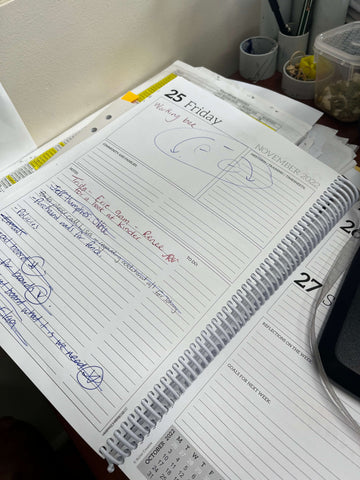
"We know there is software out there, but this is just so simple and easy to use. It's all we need to stay on top of our jobs. And it's the same price for a full year as for a month of subscription. No brainer." - Ross
"As a first time OOSH Educator (Service Leader) I am really excited about using the diary as a hard copy (old school) Educator. It appears to have everything I am going to need." - Belinda
2) The Whole Story
We have found sometimes the whole story can get lost on digital platforms. Instead random streams of photos and updates are included that don't often show the overall story and experience in the room and for the children. Our Diaries are designed to simplify documentation into a format everyone can understand, follow, and contribute to.
"They sit on top of the girls' lockers in their rooms. And so then the parents can flick through and they can see whatever has been programmed... And then they can also flick through and see the reflections and photos and all of that too. It's just really straight forward for everybody. For the department, for parents, for the educators.... for everybody." - Brady Bunch Staff Member
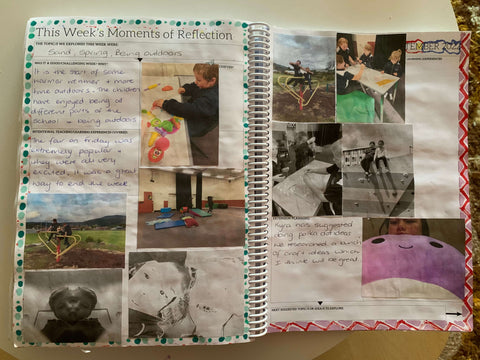
"[The lead educator] went away for three weeks to Japan. And I wrote everything in the book and when she came back and she read it and she said to me the next day I can see how good that book is. I understand now, she said, because I can see why you did something and where it led to. And I can see in the book what has happened and I can see how you've introduced things because of what the children have actually said or the parents have said it's brilliant." - Leanne

3) Immediate Engagement
Paper documentation, such as our Diaries, offer a tactile experience that many families and educators still value. Feedback we often hear is that families, children and even assessors come in and flick through the pages, easily seeing how children's learning and the cycle of planning has been captured.
"I feel like it has everything and it is so easy to understand. We have parents that have come in and flicked through and read it and say the same thing. They know what we're writing. And everything is just so self explanatory, it's all right there." - Brady Bunch Staff Member
"I am digital now but 2024 I'm switching back to paper as not one of my families are interested in the digital. I had more interest and interaction with families and the children with paper then I ever do now with digital also" - Kirsty
It allows parents and children to engage with what has been happening in the classroom together. Children can share their learning journeys in real-time, offering them a sense of autonomy that digital platforms might not easily replicate.
4) Collaborative Documentation
Our uniquely crafted Diaries are designed to foster a cooperative environment between children and educators. These tools encourage children to add their personal touches, be it through words, drawings, or pictures. Such hands-on involvement is often not as easily achieved through digital platforms, which can be limiting in their interactive capabilities. The importance of hands on involvement is summarised by the NQF review:
"Providing children and young people with opportunities to participate in documentation and assessment of wellbeing, learning and development supports children to become effective communicators" [and] "They [Assessors] may sight documentation about children and young people’s participation in the program that is collected by the child and by educators in a format that is interesting for the children, young people and their families..." [and] "showing examples of children and young people having opportunities to contribute to program planning and evaluation." - NQF Review 2019
Paper documentation also allows educators and staff in the service as a whole to contribute to and add their reflections to what is happening. Digital access for educators would be more limited as they do not spend time on technology when engaging with children and many services do not have computers in the rooms.
"The department came to give us A&R and they were so impressed with it." "They could see everybody was involved in it and every person that worked there had written something." - Leanne
"I come in and go hey, I didn't see you doing the planes, but I know it's been done. And then they'll say to me, I didn't know that story was read and I'll go no, because you were outside and I was reading it inside. So you get a whole picture of the group and the day because of being long days, you do miss things. So by having your book there and everybody writing in it, you get a whole picture of what has happened today." - Leanne
5) Relationships
When educators document children's learning with them, it is an opportunity to foster relationships and connections. While this experience can be shared using technology, it often eliminates children being able to see and engage with the whole picture as you document. Our Diaries have the whole learning on display as it emerges.
According to Bronfrenbrenner, children benefit by seeing positive interactions and relationships between their ecosystems (educators and families). These interactions are often reduced or children do not see as much of it when it happens digitally rather than face to face.
"We love the diary as a central hub for planning and communicating!" - Bindi

"You write what you want to write as your reflection for the month. You can even write how you've had a crap time over the weekend. So I wrote you know, it was a bad month and I didn't like this but I enjoyed you know, the excursion or something. The next person wrote their own thing. And it was really good to do because it was a way you could read each other's stuff so you knew that your co worker might have been having a bad day or might have been having a really good time in the last week or something affected them. You may not have picked it up while you were working, but it's in the book. And you tend to write things rather than say things. I'd write I was having a hard time using the computer and my co-worker would come up and go I'll do your computer work today. Can you do my other work that you're good at? So it was a way of tackling things without having to actually speak as well. We still spoke we're very close. Don't get me wrong, but it is that little bit easier to write what we actually felt rather than trying to say it to somebody's face." - Leanne
6) The Pickup and Drop-Off Advantage
Another advantage of paper-based documentation such as Diaries is the pickup and drop-off interactions between families and children. Families have the opportunity to discuss the day's activities and accomplishments, thereby enhancing the child's ability to reflect on their learning. This face-to-face dialogue is invaluable and irreplaceable, building stronger relationships and promoting reflective thinking in children.
This is often missed when families view learning throughout the day digitally and it is forgotten by the time children are picked up hours later.
7) Children's Identity
Children's sense of identity and achievement is fostered when they hear and participate in conversations between educators and families celebrating children's achievements. These conversations occur less often when children's achievements are shared digitally as they happen. Our Diaries promote displaying children's learning and reflections which in itself promotes celebration and a strong sense of identity (EYLF LO1).

8) Children's Privacy
Many families may not want children's photos and learning captured digitally and included on a digital platform. It is always important to make sure permission is attained and consideration to children's privacy is a priority.
"Ethical partnerships are formed when information is shared responsibly, and educators take safety precautions to ensure children’s right to privacy and protection." - EYLF, pg. 15
9) Training and Upskilling Staff
The feedback below shows our Diaries are often used as tools to train and upskill new educators, providing a source of direction and prompts to assist them in providing the best outcomes for children and the service.
"This is a practical book that can be adapted to the needs of different services. I like that the guidelines provide a scaffold for those educators who are beginning their journey in programming and critical reflection". - Leonie
"As a new ECT it is hard to know what to do and how to think through the lesson planning, but the QKLG Butler diary makes it simple and clear. The diary makes reflections meaningful and worthwhile." - Pete
"A comprehensive, detailed and organised planner that is pretty amazing. As a new ECT, I feel more confident with work. Customer service was amazing, fast post. Thanks so much." - Barb
"I am absolutely blown away by this diary. I am new to being a room leader and I highly recommend this for all educators. Have already started planning jan, feb and march with this diary." - Georgie
"We will be relying fairly heavily on the Chef's Diary for the new centre because they likely won't have experience with children and in a childcare setting. Our plan is that then that should help them to become accustomed with how everything should be." - Brady Bunch
Even seasoned staff can sometimes fall into patterns and things can go unnoticed or be missed. We have received endless feedback that our Diaries act as a prompt to ensure everything is covered.
"We find the Butler diary for OSHC a great tool to keep our observations and reflections flowing. It prompts the staff and covers areas needed. It pairs well with our programing practice and day book." - Sandy
10) Creativity
We've been receiving examples of the Weekly Programming and Reflection Diary in action from our customers and it has really shown that the Diaries enable a creative outlet. Educators are able to document as they best view the learning, enabling them to create a cycle of planning that is the most visible.
Anju includes mind maps to link the learning that has occurred:
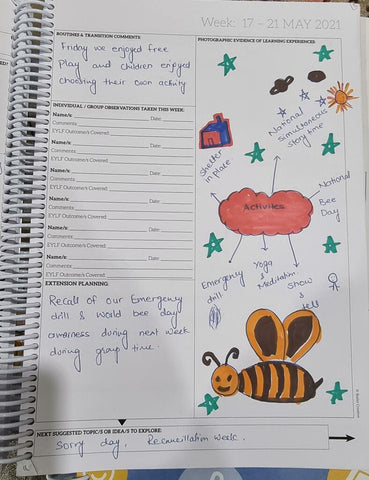
While others use coloured pens to organise their experiences:
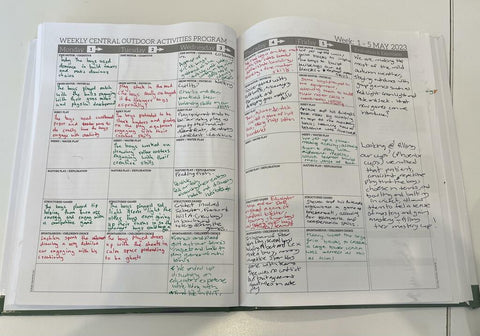
And some, like Torquay kids, use highlighters to show links to EYLF:

So, Paper or Digital Documentation in ECEC?
There is no right answer. We cannot say paper or digital is better. What we can say, is we 100% believe there is still a role for paper-based Diaries in ECEC. What we recommend is reflecting on your method of documentation within the context of your ECEC to determine the right method for you.
"There is no prescribed method in the National Law or Regulations for documenting the educational program, assessments or evaluations. There are many different electronic, visual and paper based ways to document. A service can explore a range of styles and methods to determine what works best for their children, families and educators." - NQF Review 2019
Many of our customers use both digital and paper documentation to capture children's learning in a variety of ways. Rachel from Brady Bunch described how the learning outcomes are transferred from the Weekly Programming and Reflection Diary to Story Park to share with families where they are expanded on through learning stories.
All our Diaries can be used in this way, creating a balanced and equitable approach to documentation in ECEC.
Conclusion
So, when pondering the question of sustainability in ECEC documentation, remember that each medium has its merits. For further inquiries or to discuss your specific requirements, please feel free to reach out to us. Your success is our priority, and we're here to facilitate your journey in Early Childhood Education and Care.
Thank you for entrusting us with your educational documentation needs.











